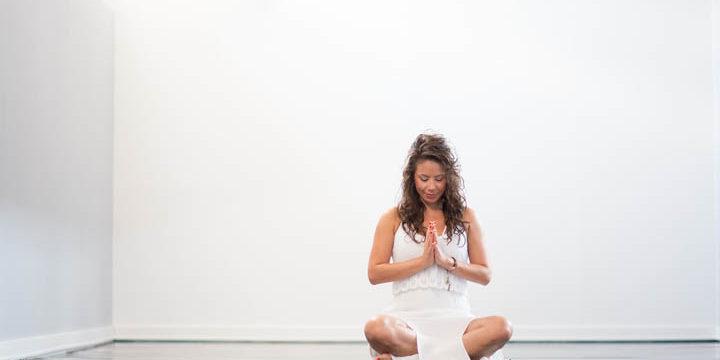Chanelle Camire has the uncanny ability to make anyone she engages feel warm, welcome, and at ease. Her talent is at once natural and well-honed, and absolutely indispensable in the world of health and wellness. Since addiction ravages the mind, body, and spirit, it stands to reason that effective treatment compassionately addresses all of these elements. As the Director of Health and Wellness at the Process Recovery Center, Chanelle’s approach is loyal to the tenets of holism. Rather than viewing addiction as a singular problem, Chanelle tailors her wellness interventions to honor the mind-body-spirit system as a whole. The Process Recovery Center benefits immensely from Chanelle’s holistic teachings both on and off the yoga mat.
Recently, Chanelle sat down with me to share some of the work she has been doing in the Process community and to discuss the ideology behind her interventions. The following is a behind-the-scenes look at Chanelle’s philosophy as excerpted from the time we spent together:
“Waking up and living a healthy lifestyle takes a lot of time, exploration, compassion, and commitment. I try to be very loving and kind in my approach while simultaneously being very direct. Forthrightness always gets the clients’ attention. This is a whole new lifestyle for the clients. They’re overwhelmed and they don’t feel well, so I do my best to introduce healthy changes that are attractive and attainable.
To begin, I teach yoga as the art of living vs. having a flexible body. Most people are very intimidated by yoga, so I focus on yoga philosophy. We talk about the myths surrounding yoga, mindful living, meditation, and spirituality. There can be a lot of pressure to be perfect. Most people say: “Oh, when I do yoga/meditation, my brain goes crazy”. So, I encourage people: “That’s great. Now you know your mind is thinking”. The practice is never about shutting down the mind but more about buckling ourselves into our seat and seeing what happens without judgement. You can have unhealthy, crazy thoughts. It’s part of being human. So when you begin practicing yoga/meditation, you start to gain insight on what’s happening for you. You can learn how to lean back away from the cravings, desires, and self-sabotage, and begin to let them move through you, vs. controlling you and causing you to act out. In The Untethered Soul, Michael Singer talks about making a commitment to keep your heart open no matter the circumstance. Singer writes that there is nothing in life worth closing your heart over – and that every time we close down to protect ourselves, we’re actually locking in our pain. So I focus on how to remain open to life, especially when it hurts.
Frequently, when people are in recovery, there’s this guilt that they need to be doing something all the time to hurry up and recover. It’s so important for clients to learn how to give themselves permission to just be, slow down, and take a breath one moment at a time. Stress management is such a powerful tool. It will not only support them in their long term recovery, but in every aspect of their lives. Everyone needs stress management!
I’m very transparent and I speak openly with clients about what to expect. I always tell them: “Your brain is going to tell you I’m manipulating you right now. It’s going to tell you that you don’t feel like doing this, that you’re too tired, and to leave the room. You’re going to hope that I stop talking because I’m annoying. You might start laughing, crying, or feeling like you’re going to fart the entire time.” I really try to humanize the experience and it helps them relax. Someone always says: “Wow, my brain did all of those things”. I feel the best approach is to anticipate their needs before they even know they exist.
My group session is almost like a therapeutic yoga and spa experience. The form of therapy I’ve been taught is the belief that all human beings can be rehabilitated through LOVE. So that’s what I do at the Process. I teach self-love through every possible vehicle. The clients love receiving bodywork throughout the session. I do a lot of massage, Reiki, acupressure, and adjustments with therapeutic grade essential oils. It blows my mind to see how well clients respond to the aromatherapy. They beg for the oils the moment I step onto the property. These therapies are also causing a shift in the clients’ pain management. They’re learning the power of self-care. I really hope the clients can believe – with every cell of their body – that they are lovable and that they are their best investment.
I do a check-in with the clients and I always ask them: “How did you feel before and how do you feel now?” For the most part, I hear: “I had anxiety. I didn’t feel well. I was tired. I wanted to use. I felt worthless and I was struggling”. Afterward, they often say: “I feel so much better now. I needed that”.
I think that to come into a recovery program – to be in an environment where you take this big chunk of time to really be with yourself, unravel it all, be vulnerable, and have a wide open, broken heart – is probably the best thing anyone can do, addict or not. I think our entire world needs to have its heart broken open – and then keep it open. We all need to heal and I’m committed to being part of that process. Since I was a little girl, I knew my purpose in life was to wake people up. So everyday, I start with myself and let it flow out into the world”.
Chanelle Camire/ Contributor
Autumn Khavari/ Contributor



